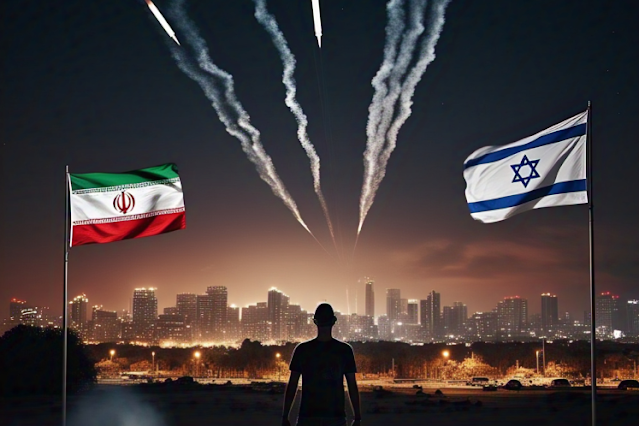In recent months, global headlines have once again zeroed in on the escalating conflict between Iran and Israel. But why is Iran attacking Israel, and what makes this round of hostility different from previous ones? To truly understand this volatile geopolitical tension, we must examine a less obvious angle—one rooted in proxy warfare, ideological legitimacy, and strategic deflection amid a rapidly changing regional order.

🧠 Behind the Missiles: A Crisis of Ideological Legitimacy
The mainstream narrative often focuses on missile launches, retaliatory strikes, and high-profile military exchanges. But according to experts at the International Crisis Group, these surface-level events are often symptoms, not causes. At its core, Iran's aggression toward Israel serves a dual purpose: bolstering its ideological credibility at home and across the Shia axis while diverting attention from growing domestic unrest.
Iran's ruling regime, under increasing pressure from internal economic crises, women-led protests, and international sanctions, is navigating a legitimacy deficit. By intensifying hostilities with Israel, Tehran repositions itself as the vanguard of anti-Zionism, consolidating loyalty among hardline factions and regional allies. As Dr. Sanam Vakil of Chatham House notes, "Iran's foreign policy is deeply intertwined with its internal narrative of resistance and survival."
🕵️♂️ Proxy Warfare: The Silent Hands in the Shadows
Rather than engaging in direct military conflict, Iran often acts through proxy militias such as Hezbollah in Lebanon, the Houthis in Yemen, and various Iraqi and Syrian paramilitary groups. This strategy allows Tehran to apply pressure on Israel while minimizing direct exposure to retaliation. According to the Washington Institute for Near East Policy, Iran’s Quds Force plays a critical role in coordinating these efforts under the guise of “regional defense.”
Israel, on the other hand, has grown increasingly assertive in targeting Iranian supply lines, weapons convoys, and military advisors in Syria. Each skirmish deepens the proxy war, where both powers avoid full-blown war while sustaining a high-stakes strategic chess match.
📡 Strategic Deflection: A Foreign Policy to Mask Internal Fires
The Iranian regime’s need to project strength externally is not coincidental. With inflation soaring and international isolation growing worse, the regime is struggling to maintain the loyalty of its younger population. Engaging in symbolic acts of resistance against Israel serves as a political distraction and a unifying force, even if it invites global condemnation.
A 2024 analysis by Carnegie Middle East Center suggests that Iran’s pattern of escalation often coincides with periods of intense domestic instability, including economic downturns or mass protests. In this sense, Israel becomes both a target and a tool—a focus point through which Tehran reasserts control over its narrative.
🕊️ Diplomatic Fallout and Global Consequences
The attack on Israel also has ripple effects beyond the Middle East. The U.S., a staunch Israeli ally, continues to tighten sanctions and reassess its defense posture in the Gulf. Meanwhile, Iran's actions have complicated Arab-Israeli normalization efforts under the Abraham Accords, with countries like Saudi Arabia becoming increasingly cautious.
According to Reuters, recent Iranian-backed attacks have derailed secret talks between Israel and Saudi officials, pushing regional diplomacy back into cold storage. The Gulf states, though wary of Iran, are also reluctant to be seen as fully aligned with Israel amid Palestinian tensions, further complicating the strategic calculus.
⚖️ Not Just a Regional Feud—A Global Balancing Act
To frame the situation as just another chapter in a Middle Eastern rivalry is to miss its broader implications. This is a global balancing act, where Iran’s attacks on Israel reflect not just enmity, but also a carefully calculated effort to reshape regional dynamics, project soft power through proxy allies, and reinforce its waning ideological influence.
The United Nations, EU, and major global powers have all condemned the recent strikes, but solutions remain elusive. With no clear off-ramp, the world watches as two deeply entrenched adversaries escalate—not always in open battle, but in a multi-layered hybrid war that threatens to redraw the map of the Middle East.
